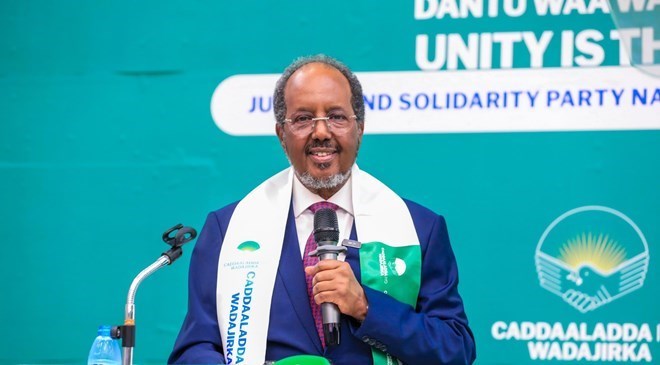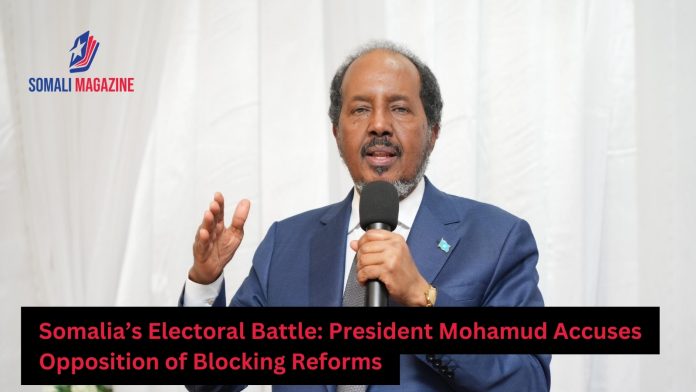Facebook Twitter (X) Instagram Somali Magazine - People's Magazine
Somali President Hassan Sheikh Mohamud has accused opposition politicians, lawmakers, and regional leaders of obstructing the country’s transition to a one-person, one-vote electoral system, warning that reverting to indirect elections could destabilize Somalia’s fragile political landscape. His remarks, delivered during a Somali Youth Day celebration in Mogadishu, underscored his administration’s commitment to electoral reforms despite mounting resistance from political rivals.
Mohamud defended his government’s push for direct elections, arguing that Somalia must move beyond the era of political elites handpicking leaders behind closed doors. He emphasized that voter registration had officially begun in the capital, with legislative frameworks already in place to facilitate the transition. “The Somali people now hold the power,” he declared. “The era of political elites deciding the nation’s future in secret is over.”
The president’s comments come amid growing tensions between his administration and opposition figures who argue that the electoral reforms lack inclusivity and transparency. Critics claim that the government has sidelined key stakeholders, including Puntland and Jubbaland, in the decision-making process. They warn that the rushed implementation of direct elections could lead to disputes over legitimacy and governance.
In a significant political move, 103 members of Somalia’s bicameral Federal Parliament issued a joint statement calling for Mohamud’s resignation. The lawmakers accused him of abandoning his constitutional duties, dismantling the National Consultative Council (NCC), interfering in federal member states, and using state resources to advance a partisan agenda. They also criticized his failure to convene a promised national dialogue, arguing that his administration’s divisive approach threatens national unity.
Mohamud also took aim at opposition leaders who have questioned the military’s ability to combat Al-Shabaab. Without naming individuals, he accused certain politicians of undermining national security efforts. “A politician who says a battalion can’t fight—what is he really saying? Is he defending Al-Shabaab? Is he trying to alarm the public that Mogadishu will fall? We don’t understand his intent,” he stated.

The president warned that returning to indirect elections could destabilize Somalia’s political process, citing past instances where parliamentary seats were allegedly sold and manipulated. “Last time, members of parliament were chosen in two hours and stuffed into people’s pockets,” he said. “Even those who picked them didn’t benefit. Why would we do that again? If we do, this time it may cost lives.”
The formation of the Justice and Stability Party (JSP), officially launched this week in Mogadishu with Mohamud as chairman and presidential candidate, has further fueled political controversy. Critics argue that the creation of the party blurs the line between state and party, particularly as many of its leaders currently hold public office. Prime Minister Hamza Abdi Barre, Deputy Prime Minister Salah Jama, First Deputy Speaker Sadia Yasin, and Southwest President Abdiaziz Laftagareen were named as vice chairpersons, while former Interior Minister Abdirahman Odowaa was appointed secretary-general.
As Somalia moves closer to implementing electoral reforms, the debate over the one-person, one-vote system highlights broader governance challenges. While supporters argue that direct elections will strengthen democracy and promote national unity, opponents warn that the process is being rushed without adequate safeguards. The coming months will be critical in determining whether Somalia can successfully transition to a more inclusive electoral system or whether political divisions will derail the reform efforts.

